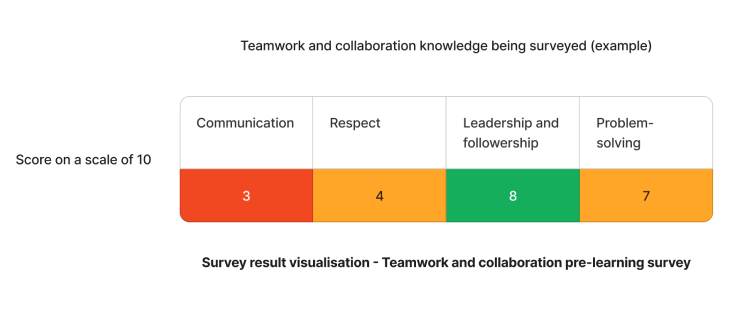What is Collaboration and Teamwork?
In the context of healthcare, collaboration is the process by which different professional groups work together in an interdependent manner to deliver patient-centered care. Teamwork is the combined effort of a group to achieve common goals, such as patient safety and quality care, through shared communication and cooperation. Both elements are integral to the successful functioning of healthcare services and the delivery of comprehensive care. Teamwork requires an understanding of the strengths and skills of each team member, a commitment to shared objectives, and the ability to negotiate and manage conflict. Collaboration extends this by involving mutual respect among team members and disciplines, fostering an environment where ideas and strategies are synergistically developed and implemented for superior patient outcomes.
What is the "Teamwork and Collaboration" Training Requirement?
According to the National Safety and Quality Health Service Standards (NSQHS), Actions 5.05 and 5.06 mandate the necessity for healthcare organisations to develop training programs that foster a culture of collaboration and teamwork. Such training aims to enhance patient care by promoting consistent and effective team-based communication.
Relevant Standards
Action 5.05: Collaboration and teamwork:
Processes are in place to:
- Support teamwork and multidisciplinary collaboration
- Define and delineate roles and responsibilities of each clinician working in a team
Action 5.06: Collaboration and teamwork:
Clinicians work as a team in a collaborative manner to plan and deliver comprehensive care
National Safety and Quality Health Service (NSQHS) Standards
Failure to comply with the requirements could lead to an organisation being penalised or reprimanded.
What Skills Do Staff Need for Collaboration and Teamwork?
The effectiveness of collaboration and teamwork in healthcare is largely dependent on the skill set of the professionals involved. Here we detail the essential skills needed for successful collaboration and teamwork.
| Skill | Description |
|---|---|
| Communication | Ability to express thoughts clearly, listen actively, and constructively engage in feedback. |
| Conflict Resolution | Skills in negotiating and finding mutually acceptable solutions within a team. |
| Respect | Valuing the knowledge and abilities of other professionals to foster a positive team environment. |
| Leadership and Followership | Flexibility in assuming different roles within the team as appropriate for efficient functioning. |
| Problem-solving | Capability to collaboratively address and resolve patient care challenges. |
How to Assess Staff Competency in Collaboration and Teamwork
To ensure staff are working together effectively, it is crucial to assess their competency in collaboration and teamwork. The following list outlines various methods to assess these competencies within healthcare teams.
- Self-assessment tools for individual reflection and identification of improvement areas.
- Peer assessments and 360-degree feedback to provide comprehensive insights into teamwork abilities.
- Direct observation and supervisor evaluations to offer objective assessments of team dynamics in action.
- Simulation exercises to assess and refine teamwork skills in controlled environments.
- Patient feedback to gauge the impact of team collaboration on care delivery.
Strategies to Support Healthcare Staff Reinforce and Develop Collaboration and Teamwork Skills
Once the required skills and areas for development have been identified, the next step is to implement strategies that support skill development. Below is a compilation of strategies that can be utilised to foster and enhance these competencies among healthcare employees.
- Mentoring and coaching programs that pair less experienced staff with seasoned professionals.
- Team-building activities and workshops to improve team cohesion and teach effective collaboration.
- Simulation training for practicing teamwork skills in realistic, risk-free scenarios.
- Regular and constructive performance feedback to reinforce positive team behaviors.
- Creating collaborative workspaces to encourage teamwork naturally within the work environment.
Sample Training Plan for the Collaboration and Teamwork Training Requirement
The ability of staff to conduct care as part of a team can be reinforced through an effective training program upon identifying the areas of lacking skills (via needs assessments).

Using the above needs assessment survey as an example - The teamwork and collaboration skills that require the most attention are communication skills. We can target learning initiatives to fill these gaps to enhance staff competency.
| Quarter | Topics | Resources |
|---|---|---|
| Q1 | Communication |
Need an LMS that can support collaboration and teamwork training?
Contact Ausmed today and see how we can support with your collaboration and teamwork training requirements!
Staff Competency Assessment for Collaboration and Teamwork - Example
The following questions can be utilised within surveys to assess an individual's capabilities in collaboration and teamwork:
Staff Survey - Collaboration and Teamwork Competency
-
How often do you engage in active listening during team discussions?
- Not often
- Somewhat often
- Very often
-
Describe a situation where you contributed to a team solution.
- [Answer here]
-
How do you approach conflict resolution within your team?
- [Answer here]
-
Rate your comfort level with assuming leadership roles when required.
- Not comfortable
- Comfortable
- Very comfortable
-
How do you support your colleagues in a collaborative project?
- [Answer here]
Conclusion
Collaboration and teamwork are essential components of a high-functioning healthcare system. Training programs designed with a clear understanding of the required skills, along with effective strategies for developing and assessing these competencies, are critical for the provision of quality patient care. Regular skills assessment and tailored development plans will help maintain a workforce capable of effective teamwork, ultimately improving patient outcomes.
References
- Australian Commission on Safety and Quality in Health Care, 2023. 'NSQHS Action 5.05'
- Australian Commission on Safety and Quality in Health Care, 2023. 'NSQHS Action 5.06'



